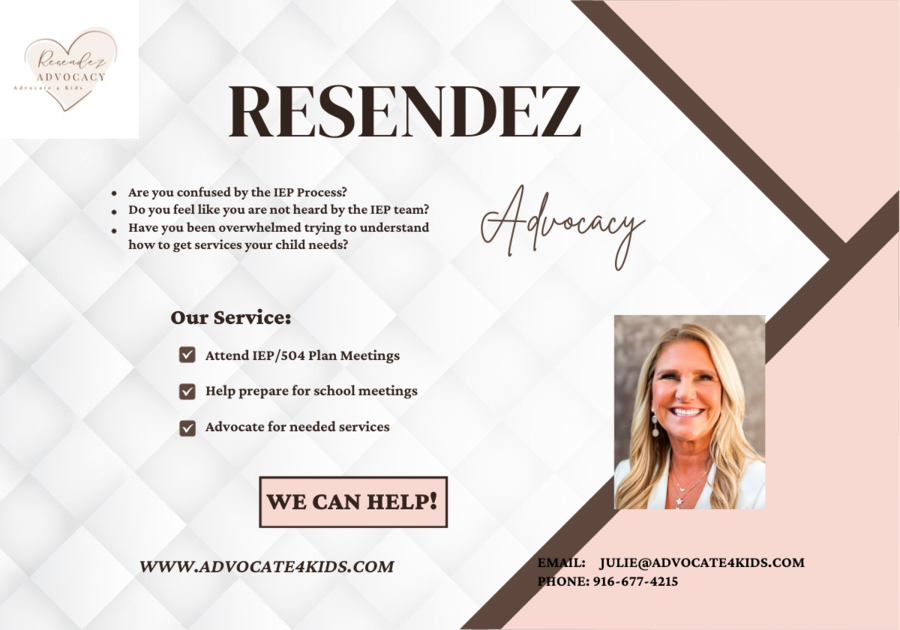Editors note: Julie Resendez is here to help answer some common questions [parents have when navigating the IEP process
 |
I started my career in public education as a teacher, site administrator, special education director, and most recently, superintendent. I also experienced the IEP process as a mom. All these experiences have led to my passion to help parents navigate a complex, confusing system and get the services and support their children need to succeed in school and life beyond school. Below are common questions I get from parents regarding special education. I hope you find them helpful and if I can assist you with your child, please contact me!
Follow us on Facebook and Instagram for tips on supporting your child in school.
Julie@advocate4kids.com
916-677-4215 advocate4kids.com
If I request special education testing for my child, how long does the school district have to respond?
They must respond one of two ways: 1) They can provide you with an assessment plan within 15 calendar days outlining what assessments will be completed and who will be completing them OR, 2) They must provide you with a written response within 15 calendar days as to why they are refusing to assess your child.
What paperwork should I expect to get at the IEP team meeting or prior to that meeting?
You should get a copy of all reports and IEP paperwork at the IEP team meeting. Prior to the meeting, you should get a notice of when and where the IEP team meeting will be held in addition to who will be attending that meeting. Sometimes you will be asked for input regarding your child prior to the meeting. This is a good thing and we encourage you to respond.
I am confused about the documents or do not agree with what is in them and am being asked to sign them. What should I do?
You can sign that you were present for the meeting but do not have to sign an agreement with the IEP at the meeting. Many times it is nice to take all the paperwork home and read it and think about what it all means and how it affects your child’s education. It is better to wait to sign paperwork than it is to sign it and then change your mind.
Can I bring someone with me to meetings with the school?
Yes! You can bring anyone who is a support to you and has knowledge about your child. This can be helpful for you in a variety of ways. It is someone else to hear what is being said at the meeting so you can discuss it later and process all the information. It can also be someone who can help articulate what you are trying to say. That person can also bring ideas and perspectives to the team that will help support your child in forming the IEP.
I have so many questions about the information the school has shared with me and some of it does not reflect what we see at home. Is it appropriate to ask questions at meetings with school personnel and explain what we see if it varies from what they see in my child at school?
Yes! The school personnel are required by law to involve you in the IEP process and ensure you understand what results mean and what they are proposing. You should ask as many questions as you need to feel comfortable. Do not be intimidated to give your perspective about your child. If you have questions before the meeting, it is always good to email those to the person you are working with at the school. Sometimes they can answer it before the meeting, but otherwise, you can request that your questions are answered during your meeting. Remember to trust your gut feeling and remember children behave differently in different situations.
My child is having trouble with behavior at school. What should I do?
Whether or not your child has an IEP, the school should be meeting with you to discuss the concerns and develop a plan of support. The plan should be one of what the school personnel will do to help support school-appropriate behaviors and not one that is punitive. The plan should teach your child new behaviors and have reinforcements that are motivating for your child.
My child has been diagnosed with Autism, but the school says he or she does not qualify for special education under Autism, but says he or she does under Other Health Impaired. Should I be concerned?
Not necessarily. There are 13 categories in the Education Code under which a student can qualify for special education services. Once a student qualifies under one of those categories, the IEP team must develop an IEP (Individualized Education Program) for the student to address the areas that are impacting their progress in education. So essentially, it does not matter how they qualify, just that they do qualify.
This information is NOT legal advice and is for information only.





